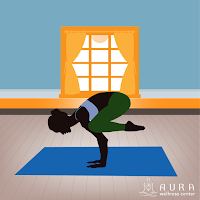By:
Virginia Iversen, M.Ed
If you
are a Yoga teacher, there are many subtle nuances during the course of teaching
a class when embodying courage is necessary. The very first step in your
teaching career, of course, was actually signing up to become a certified Yoga instructor. When you first began to contemplate becoming a certified teacher,
you probably bumped up some against internal resistance and perhaps even some
physical limitations during the course of your Yoga teacher-training
program.
However,
if you are a fully certified Yoga teacher, you have clearly surmounted these
initial obstacles to becoming a certified instructor. In the same way, when you
are sequencing your classes, there are many different levels and subtle
shadings of courage, integrity and safety issues that must be adequately
addressed, in order to offer your students a challenging, invigorating,
restorative, and healing Yoga practice.
If you
have been teaching Yoga classes for some time now, you may start to feel that
your classes are becoming a bit routine. When your own classes begin to bore
you, you can bet that some of your students are also bored with the same
pattern and sequencing of postures, breathing exercises and relaxation techniques! In order to breathe fresh life into your classes,
implementing some creative themes will help to create a sense of newness and
vibrancy into the practice. There are many different ways to implement creative
themes into your classes.
Structuring
your Yoga classes around internal creative themes can be a very effective and
interesting way to lead a group of students through a comprehensive practice.
At other times, you may find that creating a sequence of postures and breathing
exercises that complements the current season is a wonderfully engaging and
therapeutic way to structure your Yoga classes. Many teachers also find that
structuring a sequence of asanas, which naturally culminates in the practice of
a pinnacle posture, is one of the most effective and seamless ways of
generating new energy and enthusiasm for the practice.
*
Creative Internal Themes
A very
creative and engaging way to structure your Yoga classes is to use different
emotional states as end points for the practice. In other words, the simple
theme of happiness could inform your choice of asanas, pranayama exercises and
meditation techniques, which you include in your Yoga class. A class that is
organized in such a way to promote feelings of lightness, buoyancy and
optimism, will often include a series of detoxifying Sun Salutations and
heart-opening, back bending postures. In addition, ending your class with a
brief period of meditation focused on gratitude, self-love or forgiveness, will
help to augment the uplifting effects of the heart- expanding Yoga postures
that you have chosen for your class.
*
Creative External Themes
A very
simple and creative way to sequence your Yoga classes is to offer your students
seasonal variations to many of the classical vinyasa series. By tethering your
classes to the seasons, you will be helping your students to maintain their
physical and emotional balance throughout the course of the year. For example,
during the heat of the summer, you may find that the most appropriate way to
structure your classes is with an emphasis on supported back bending postures
and cooling forward bends. By emphasizing restorative, cooling poses in your
classes during the hot summer months, your students will feel refreshed
and replenished at the end of their practice.
*
Choosing a Creative Pinnacle Pose as a Class Theme
Another
way to implement a creative theme in your Yoga class, is to choose an
appropriately challenging posture to work towards during the class. The
pinnacle pose around which you anchor and theme your class will depend on the
ability level of the students in your class. It is optimal to choose a Yoga
posture that is manageable, yet still strenuous enough to offer a substantial
challenge to most of your students.
Some
well-loved pinnacle postures that many Yoga teachers use to creatively theme
their classes are Upward Facing Bow, Headstand and Crow Pose. Organizing your
classes around an appropriately challenging pinnacle pose will create a clearly
defined benchmark, by which your students can evaluate their practice. When
your students are able to competently perform the pinnacle pose that you have
chosen, their sense of accomplishment will create new energy and enthusiasm for
practice of Yoga as a whole.
Virginia
Iversen, M.Ed, has been practicing and studying the art of Yoga for over twenty
years. She lives in Woodstock, New York, where she specializes in writing customized
articles that are 100% unique. She is currently accepting Yoga and
health-related writing orders and may be contacted at: enchantress108@gmail.com.
©
Copyright – Virginia Iversen / Aura Wellness Center – Publications
Division
See our
testimonials to find out what our graduates have to say about our selection of
online yoga teacher certification courses.
Please feel
free to share our posts with your friends, colleagues, and favorite social
media networks.





2 comments:
Structuring Yoga classes around internal creative themes can be a very effective and interesting way to lead a group of students through a comprehensive practice. Thank you very much Dr. Paul Jerard for posting this type of useful article.
Implementing some creative themes will help to create a sense of newness and vibrancy into the practice. Thanks for this good posting!
Post a Comment